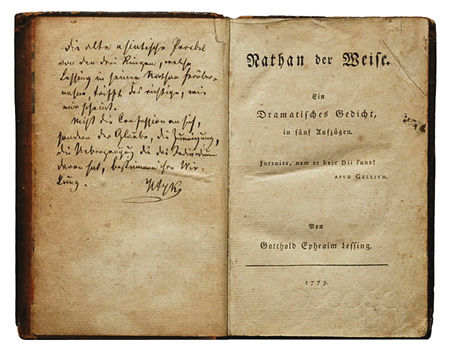47. Gotthold Ephraim Lessing (1729-1781), Nathan the Wise, 177978
The German writer Gotthold Ephraim Lessing was the son of a clergyman, and in Nathan the Wise, he defends religious toleration. In this extract, Nathan, who is Jewish, has been telling the Muslim Saladin the parable of the three rings. This is the story of a father who possesses a priceless opal ring and does not know how best to share it amongst his three sons. He decides to have two copies made. On his death, each son receives a ring and each, believing that he alone owns the original one, is ready to fight to prove his claim. Nathan says that when it comes to religion we would do well to remember the story of the rings. Saladin doesn’t understand the point of the analogy, claiming that it is not difficult to tell Judaism, Christianity, and Islam apart. The French version of this was a translation by the poet Marie-Joseph Chénier, in which the misty opal becomes a sparkling diamond. We have not translated the translation: the acclaimed translator of Schiller, Francis Lamport, has gone back to the original and produced the following version for us, and we thank him.

Frontispiece of Nathan the Wise, 1779 edition: https://commons.wikimedia.org/wiki/File:Lessing_Nathan_der_Weise_1779.jpg
[Jerusalem in 1192, during a brief truce between Sultan Saladin and the Crusaders. Saladin summons Nathan, the Jew renowned for his wisdom, and calls on him to declare which of the three great religions is the true one. Nathan replies with a parable:]
Long years ago, there lived a man in the East
Who owned a precious ring, inherited
From one he loved. It bore a stone, an opal,
That shimmered in a multitude of colours,
And had the wondrous power to win the love
Of God and man, for him who wore it in
Good faith. [...]
[The ring is handed down the generations, from father to favourite son, until it comes to a man who has three sons, all equally beloved. Unwilling to discriminate between them, he has two replicas made, so that each son severally receives one – which he of course believes to be the one and only true one. They quarrel, and the matter comes to court. The judge pronounces: ]
[...] Unless you can produce your father
To testify before me, I dismiss
The case. What, do you think my occupation
Is solving riddles? Or do you think the one
True ring will speak out for itself? – But wait:
I hear the true ring has the wondrous power
To make its wearer loved by God and man;
That must decide! For surely the false rings
Will not do that. Now, which of you three brothers
Is most loved by the other two? Speak out!
Well, tell me! Have you not a word to say?
The rings have no effect, each one of you
Loves no one but himself? Then you are frauds,
Yourselves defrauded. And it seems your rings
Are counterfeit all three. The true one has
Gone missing, and your father had three made
To cover up the loss [...]
But if your father gave
Each one of you his ring, then let each one
Believe his is the true one. – It may be
Your father wished to put an end to one
Ring’s tyranny within his house. And surely
He loved you all, and all in equal measure,
And did not wish to disadvantage two
By favouring one. – Well, then! Let each of you
Strive just to copy his unprejudiced
And free affection! Let him seek to prove
The power of the opal in his ring,
And seek to aid that power with gentleness,
Benevolence and fellow-feeling, and
Humility before the will of God.
And when these powers are made manifest
Amongst your children’s children’s children, in
A thousand thousand years, let them be called
Before this seat once more. A wiser man
Will then be sitting here, and will pronounce
His verdict. Go! – So spoke the modest judge.
saladin. God! God!
nathan. If, Sultan Saladin, you feel
That you might be that wiser man –
saladin. I? I
Am dust, am nothing! God!
nathan. What is it, Sultan?
saladin. Nathan! Your judge’s thousand thousand years
Are not yet past. His judgement seat is not
For me. Leave me, dear Nathan, go – But be my friend.
78 Gotthold Ephraim Lessing, Nathan der Weise, 1779, Act III, scene vii.







